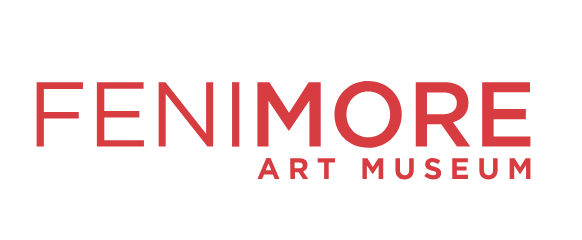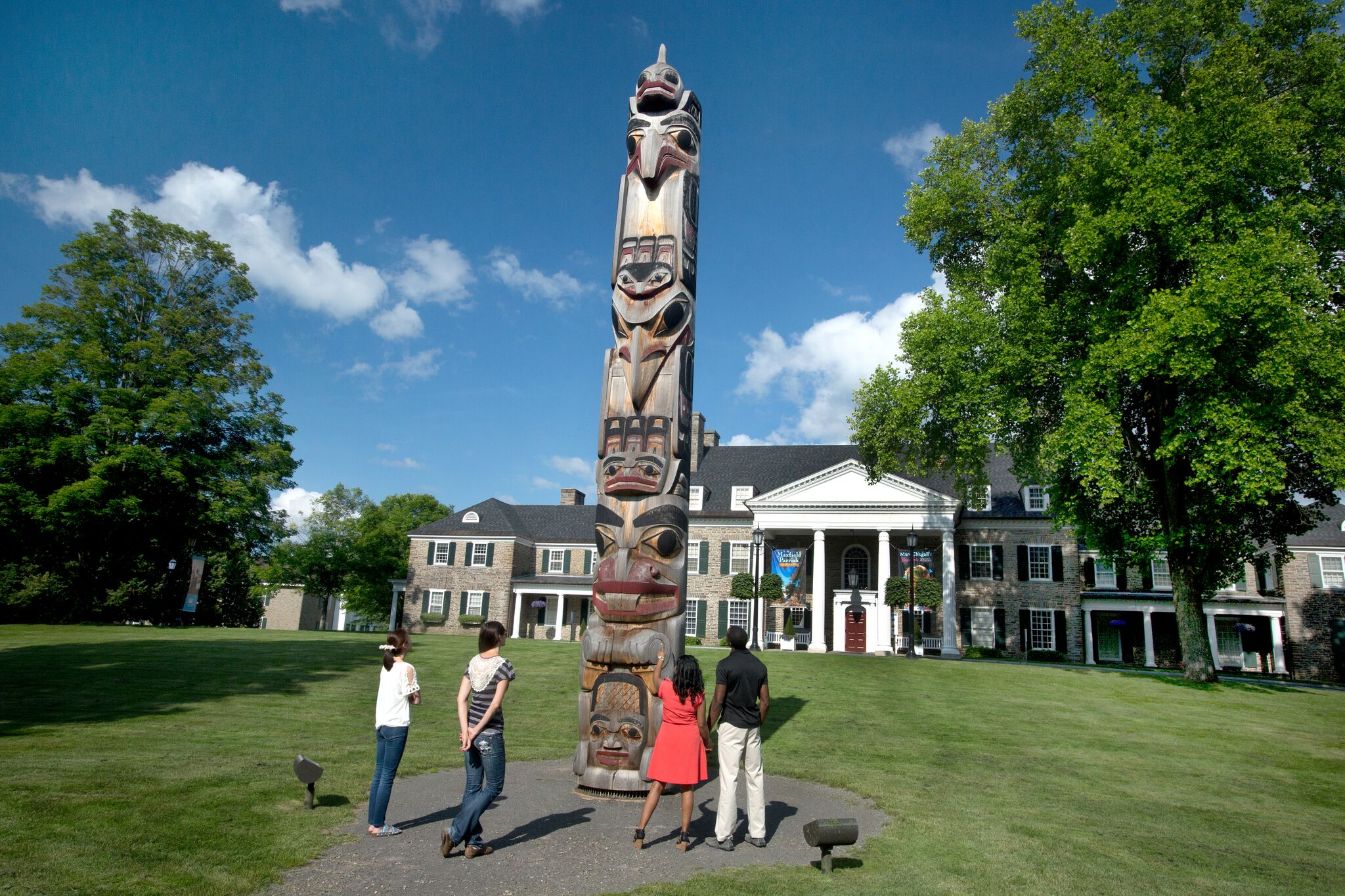
About the Fenimore Art Museum
The Fenimore Art Museum, formerly known as the New York State Historical Association, was founded in 1899 by a small group of New York citizens interested in preserving and promoting awareness of the state’s early history. In 1940 it moved to Cooperstown, NY, having been offered the Fenimore House by Stephen Carlton Clark, an avid collector of American art. Although the museum’s original focus was on art related to life in central New York, its artistic vision has expanded over the years and the museum is now recognized for its leading role in collecting and promoting 19th century American art, American folk art, and more recently Native American art. The Fenimore Art Museum offers a dynamic program of changing exhibitions and events that appeal to a national audience.
 The Fenimore Art Museum and students
The Fenimore Art Museum and students
The Fenimore Art Museum's textile collection is comprised of approximately 6500 objects, including about 500 quilts and quilt-related objects; nearly 100 samplers; hand-made coverlets; and a diverse array of clothing and costumes. From this collection, 38 samplers were contributed to the Sampler Archive database, of which all but a couple have been identified as American and are viewable by the public online at the Sampler Archive website. In keeping with the museum’s origins, the majority of needlework samplers were created by girls (as well as one boy) growing up in central New York or by individuals with ties to local New York families later in life.
From October 1 through December 31, 2016 the Fenimore Art Museum hosted an exhibition of girlhood embroideries and other schoolgirl art entitled “The Instruction of Young Ladies: Arts from Private Girls’ Schools and Academies in Early America,” organized by guest curator Robert Shaw. Objects on loan from a variety of public and private institutions showcased the range of artwork produced in 19th- century female academies and the educational contexts in which they were produced. The underlying thesis of the exhibition was that “art was a distinguishing element in young women’s education in America from the late seventeenth century on”, and that the artwork produced “had major and lasting impacts on American society and culture” (Shaw, Antiques & Fine Arts Magazine, Winter, 2016).
The Farmers’ Museum
The Fenimore Art Museum is closely affiliated with its sister organization The Farmers’ Museum, also located in Cooperstown, New York. The Farmers’ Museum site has been part of a working farm since 1813, when it was owned by author James Fenimore Cooper. Overlooking Ostego Lake, Tthe Farmers’ Museum recreates a rural mid-19th-century farming community through exhibits and interactive workshops. Its village is comprised of more than two dozen historic buildings, including an authentic farmstead, blacksmith shop, pharmacy, printing shop, lawyer’s office, doctor’s office, tavern, and general store.
The Farmers’ Museum has a collection of more than 23,000 artifacts reflecting 19th- century farm life in central New York. Among its collection of textiles are eight needlework samplers, all of which are now represented in the Sampler Archive database. Like the sampler collection in the Fenimore Art Museum, many were created by girls living in the surrounding rural communities of central New York.
Cooperstown Graduate Program in Museum Studies
Under the leadership of Dr. Cynthia Falk, students in the Cooperstown Graduate Program in Museum Studies collaborated with the Sampler Archive Project to document and research 46 schoolgirl samplers from the collections of The Fenimore Art Museum. Documentation was conducted by students taking two different courses, one in the Spring of 2015 and one in the Spring of 2016. Instruction providing an overview to historic samplers as material culture, as well as training and support in Sampler Archive documentation procedures, was conducted via interactive webinars by Dr. Lynne Anderson, Director of the Sampler Archive Project.
The Cooperstown Graduate Program in Museum Studies in Cooperstown, New York is an academic program within the State University of New York’s College at Oneonta, NY. The program offers a generalist approach to Museum Studies, enabling master’s students to explore all aspects of museum work - from collections to fundraising. Classes focus on project-based learning, where students conduct tangible, useful work on real-world projects. The program partners with local museums, historical societies, schools, and nonprofits to work on diverse projects such as interpretive plans, educational programs, budgets, and exhibits so that the program’s courses have real-world impact, and provide students with real-world skills and experience.
Documentation Team
- Erin Richardson, Fenimore Art Museum and The Farmers’ Museum
- Dr. Cynthia Falk, Cooperstown Graduate Program in Museum Studies
- Dr. Lynne Anderson, Sampler Archive Project
- Virginia Vis, Sampler Archive Project
- Lynds Jones
- Emily Koehler-Platten
- Alex Sniffen
- Karissa Carlson
- Hillary Corwin
- Brandon Emerson
- Julia Fell
- Peter Glogovsky
- Leigh Graham
- Julia Hartman
- Melissa Kiewiet
- Andrew Lang
- Greer Luce
- Cassidy Mickelson
- Luke Murphy
- Patricia Norman
- Elizabeth Remy
- Anna Romskog
- Christine Scales
- Leanne Schmadtke
- Geoffrey Starks
- Samantha Strzepek
- Joshua Taylor
- Peyton Tracy
- Sara Umland
- John Varley
- Kaitlin Webber
- Emily Welch
Objects contributed by The Fenimore Museum
Contact Information and Copyright Procedures

Christina Ely Milliman, Director of Museum and Library Collections
The Fenimore Art Museum, The Farmers’ Museum, and
Research Library
P.O. Box 800 | Cooperstown, NY 13326
Phone: 607-547-1442
Email: [email protected]

